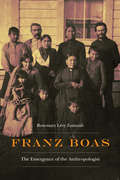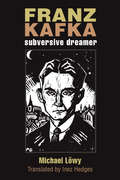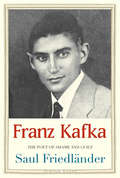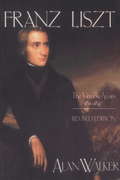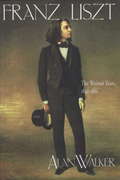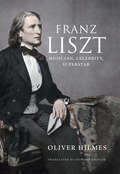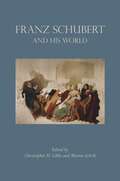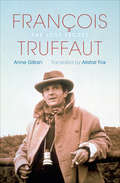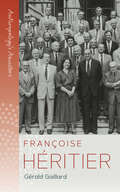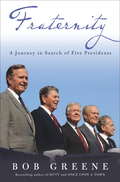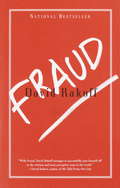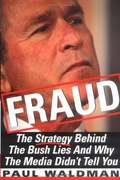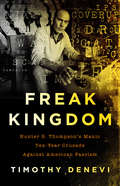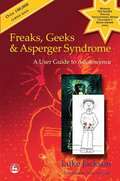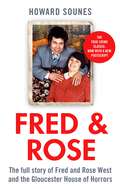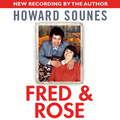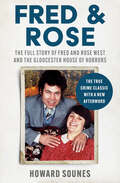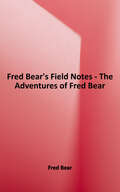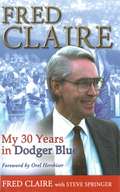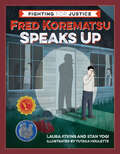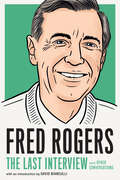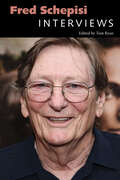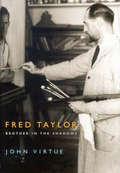- Table View
- List View
Franz Boas: The Emergence of the Anthropologist (Critical Studies in the History of Anthropology)
by Rosemary Lévy ZumwaltRosemary Lévy Zumwalt tells the remarkable story of Franz Boas, one of the leading scholars and public intellectuals of the late nineteenth and early twentieth centuries. The first book in a two-part biography, Franz Boas begins with the anthropologist’s birth in Minden, Germany, in 1858 and ends with his resignation from the American Museum of Natural History in 1906, while also examining his role in training professional anthropologists from his berth at Columbia University in New York City. Zumwalt follows the stepping-stones that led Boas to his vision of anthropology as a four-field discipline, a journey demonstrating especially his tenacity to succeed, the passions that animated his life, and the toll that the professional struggle took on him. Zumwalt guides the reader through Boas’s childhood and university education, describes his joy at finding the great love of his life, Marie Krackowizer, traces his 1883 trip to Baffin Land, and recounts his efforts to find employment in the United States. A central interest in the book is Boas’s widely influential publications on cultural relativism and issues of race, particularly his book The Mind of Primitive Man (1911), which reshaped anthropology, the social sciences, and public debates about the problem of racism in American society.Franz Boas presents the remarkable life story of an American intellectual giant as told in his own words through his unpublished letters, diaries, and field notes. Zumwalt weaves together the strands of the personal and the professional to reveal Boas’s love for his family and for the discipline of anthropology as he shaped it.
Franz Kafka: Subversive Dreamer
by Michael Lowy Inez HedgesFranz Kafka: Subversive Dreamer is an attempt to identify and properly contextualize the social critique in Kafka's biography and work that links father-son antagonisms, heterodox Jewish religious thinking, and anti-authoritarian or anarchist protest against the rising power of bureaucratic modernity. The book proceeds chronologically, starting with biographical facts often neglected or denied relating to Kafka's relations with the Anarchist circles in Prague, followed by an analysis of the three great unfinished novels--Amerika, The Trial, The Castle--as well as some of his most important short stories. Fragments, parables, correspondence, and his diaries are also used in order to better understand the major literary works. Löwy's book grapples with the critical and subversive dimension of Kafka's writings, which is often hidden or masked by the fabulistic character of the work. Löwy's reading has already generated controversy because of its distance from the usual canon of literary criticism about the Prague writer, but the book has been well received in its original French edition and has been translated into Spanish, Italian, Portuguese, Greek, and Turkish.
Franz Kafka: The Poet of Shame and Guilt
by Saul FriedlanderFranz Kafka was the poet of his own disorder. Throughout his life he struggled with a pervasive sense of shame and guilt that left traces in his daily existenceâ "in his many letters, in his extensive diaries, and especially in his fiction. This stimulating book investigates some of the sources of Kafkaâ TMs personal anguish and its complex reflections in his imaginary world.In his query, Saul Friedländer probes major aspects of Kafkaâ TMs life (family, Judaism, love and sex, writing, illness, and despair) that until now have been skewed by posthumous censorship. Contrary to Kafkaâ TMs dying request that all his papers be burned, Max Brod, Kafkaâ TMs closest friend and literary executor, edited and published the authorâ TMs novels and other works soon after his death in 1924. Friedländer shows that, when reinserted in Kafkaâ TMs letters and diaries, deleted segments lift the mask of â œsainthoodâ ? frequently attached to the writer and thus restore previously hidden aspects of his individuality.
Franz Liszt, Volume 1
by Alan WalkerThe first volume in Alan Walker's magisterial biography of Franz Liszt.
Franz Liszt, Volume 2
by Alan WalkerThe second volume in Alan Walker's magisterial biography of Franz Liszt.
Franz Liszt, Volume 3
by Alan WalkerThe third volume in Alan Walker's magisterial biography of Franz Liszt.
Franz Liszt: Musician, Celebrity, Superstar
by Oliver Hilmes Stewart SpencerAn engrossing new biography of the musical revolutionary who was the world's first international megastar Hungarian composer Franz Liszt (1811-1886) was an anomaly. A virtuoso pianist and electrifying showman, he toured extensively throughout the European continent, bringing sold-out audiences to states of ecstasy while courting scandal with his frequent womanizing. Drawing on new, highly revealing documentary sources, including a veritable treasure trove of previously unexamined material on Liszt's Weimar years, best-selling author Oliver Hilmes shines a spotlight on the extraordinary life and career of this singularly dazzling musical phenomenon. Whereas previous biographies have focused primarily on the composer's musical contributions, Hilmes showcases Liszt the man in all his many shades and personal reinventions: child prodigy, Romantic eccentric, fervent Catholic, actor, lothario, celebrity, businessman, genius, and extravagant show-off. The author immerses the reader in the intrigues of the nineteenth-century European glitterati (including Liszt's powerful patrons, the monstrous Wagner clan) while exploring the true, complex face of the artist and the soul of his music. No other Liszt biography in English is as colorful, witty, and compulsively readable, or reveals as much about the true nature of this extraordinary, outrageous talent.
Franz Schubert and His World (The Bard Music Festival #37)
by Christopher H. Gibbs and Morten SolvikThe life, times, and music of Franz SchubertDuring his short lifetime, Franz Schubert (1797–1828) contributed to a wide variety of musical genres, from intimate songs and dances to ambitious chamber pieces, symphonies, and operas. The essays and translated documents in Franz Schubert and His World examine his compositions and ties to the Viennese cultural context, revealing surprising and overlooked aspects of his music.Contributors explore Schubert's youthful participation in the Nonsense Society, his circle of friends, and changing views about the composer during his life and in the century after his death. New insights are offered about the connections between Schubert’s music and the popular theater of the day, his strategies for circumventing censorship, the musical and narrative relationships linking his song settings of poems by Gotthard Ludwig Kosegarten, and musical tributes he composed to commemorate the death of Beethoven just twenty months before his own. The book also includes translations of excerpts from a literary journal produced by Schubert’s classmates and of Franz Liszt’s essay on the opera Alfonso und Estrella. In addition to the editors, the contributors are Leon Botstein, Lisa Feurzeig, John Gingerich, Kristina Muxfeldt, and Rita Steblin.
François Truffaut: The Lost Secret
by Anne Gillain&“Truffaut fans will love this English translation of Gillain&’s work drawing on the psychology and cinematography of the acclaimed filmmaker.&” —Booklist For François Truffaut, the lost secret of cinematic art is in the ability to generate emotion and reveal repressed fantasies through cinematic representation. Available in English for the first time, Anne Gillain&’s François Truffaut: The Lost Secret is considered by many to be the best book on the interpretation of Truffaut&’s films. Taking a psycho-biographical approach, Gillain shows how Truffaut&’s creative impulse was anchored in his personal experience of a traumatic childhood that left him lonely and emotionally deprived. In a series of brilliant, nuanced readings of each of his films, she demonstrates how involuntary memories arising from Truffaut&’s childhood not only furnish a succession of motifs that are repeated from film to film, but also govern every aspect of his mise en scène and cinematic technique. &“Brilliant . . . A delicious reexamination . . . that will make us want to sit down and take in all of Truffaut&’s wonderful filmography at once.&” —PopMatters
Françoise Héritier (Anthropology's Ancestors #3)
by Gérald GaillardFollows the life of French anthropologist Françoise Héritier, who had a lasting impact on a generation of French anthropologists that continues to this day. A great intellectual figure, Françoise Héritier succeeded Claude Lévi-Strauss as the Chair of Anthropology at the Collège de France in 1982. She was an Africanist, author of magnificent works on the Samo population, the scientific progenitor of kinship studies, the creator of a theoretical base to feminist thought and an activist for many causes. “I read this intellectual biography of Françoise Héritier with great pleasure. Though highly regarded in France, she is not yet well known in English-language academic circles, but she certainly should be. This book will be a revelation to many anthropologists and feminist scholars.”—Adam Kuper, London School of Economics From the Forword by Michelle Perrot: I came to know her at the National Council for HIV, that she chaired from 1989 to 1994…. Her theoretical concerns were also crucial to the understanding of pandemics, but we did not then realise that HIV/AIDS was also a precursor and a warning of pandemics to come. She grasped the importance of conceptions of bodily ‘humours’—blood, semen, milk—that seemed to play a role in the horrific spread of an epidemic of which we knew nothing, except that it resulted in an appalling mortality rate, particularly among young men…. she was a remarkable chair, concerned to share her insights into the illness and to anchor—necessary—interventions within a framework that would be respectful of human rights.
Fraternity: A Journey in Search of Five Presidents
by Bob Greene"What if you set off on a vacation trip in search of history--and your destination was the men who had been president?" Asking himself that tantalizing question, bestselling author and award-winning journalist Bob Greene embarked on a long journey across the breadth of the nation, hoping to spend time with Richard Nixon, Gerald Ford, Jimmy Carter, George Bush and Ronald Reagan. The result of his odyssey is Fraternity. Rich with the sounds of the presidents' own voices, Fraternity is dramatic, surprising, funny, revealing, inspiring, tragic, touching and unforgettable: a story destined to be read and enjoyed not just now, but far into the future as Americans think about who we are as a people.Here is Nixon, in an unmarked office high above Manhattan, explaining the reason for his solitary walks through New York streets at 5:30 every morning. Here is Carter, riding in a Secret Service van, recalling the sting of his family's being mocked for their rural Southern heritage, even after he had won the White House. Here is Ford, beside a golf course fairway, laughing at his startled discovery that of all his presidential papers, the one worth the most on the open market was a letter from a woman who tried to kill him. Here is Bush, on the road with his son, remembering his despair and anger at encountering a swastika carved into the sand behind an elegant resort on American soil. And here is Nancy Reagan, in a Beverly Hills hotel, on the haunting first night she must stand in for her husband after the announcement of his illness.A travelogue of the national spirit that chronicles a quest stretching over fifteen years and starring the biggest names in the modern American saga, this is living history of the most human kind, and Bob Greene at his very best.
Fraud
by David RakoffA frequent contributor to theNew York Timesmagazine,Outside,Salon, andGQ, and a regular on Public Radio International's "This American Life,"David Rakoff's debut collection of essays is simultaneously laugh-out-loud funny and take-your-breath-away poignant. David Rakoff is a fish out of water. Whether he finds himself on assignment climbing Mount Monadnock in New Hampshire — donning a pair of Timberlands for his trek, only to realize with horror that "the shoes I wouldn't be caught dead in might actually turn out to be the shoes I am caught dead in. " — sitting quietly impersonating Sigmund Freud in a department store window. . . for a month, or musing on the unique predicament of being undetectably Canadian in New York City (". . . what's more spicy than being Canadian, I ask you?"), Rakoff has a gift for exposing life's humour and pathos. Fraud takes us places even we didn't know we wanted to go: expeditions as varied as a search for elves in Iceland, a foray into soap opera acting, or contemplating the gin-soaked olive at the bottom of a martini glass. With the sharpest of eyes, David Rakoff explores the odd and ordinary events of life, spotting what is unique, funny and absurd in the world around him. But for all its razor-sharp wit and snarky humor,Fraudis also, ultimately, an object lesson in not taking life, or oneself, too seriously. From the Hardcover edition.
Fraud: The Strategy Behind the Bush Lies and Why the Media Didn't Tell You
by Paul WaldmanAnalysis of the man and his first administration.
Freak Kingdom: Hunter S. Thompson's Manic Ten-Year Crusade Against American Fascism
by Timothy DeneviThe story of Hunter S. Thompson's crusade against Richard Nixon and the threat of fascism in America--and the devastating price he paid for it <P><P>Hunter S. Thompson is often misremembered as a wise-cracking, drug-addled cartoon character. <p><p>This book reclaims him for what he truly was: a fearless opponent of corruption and fascism, one who sacrificed his future well-being to fight against it, rewriting the rules of journalism and political satire in the process. This skillfully told and dramatic story shows how Thompson saw through Richard Nixon's treacherous populism and embarked on a life-defining campaign to stop it. <p><p>In his fevered effort to expose institutional injustice, Thompson pushed himself far beyond his natural limits, sustained by drugs, mania, and little else. For ten years, he cast aside his old ambitions, troubled his family, and likely hastened his own decline, along the way producing some of the best political writing in our history. <p><p>This timely biography recalls a period of anger and derangement in American politics, and one writer with the guts to tell the truth.
Freaks, Geeks and Asperger Syndrome: A User Guide to Adolescence
by Luke JacksonThe author is an adolescent with Asperger's, which gives him the special insight about the subject, but he adds to this a sense of humor and a lilting writing style which makes the book compelling and particularly relevant for AS teens.
Fred & Rose: The Full Story of Fred and Rose West and the Gloucester House of Horrors
by Howard SounesFRED & ROSE IS THE DEFINITIVE ACCOUNT OF THIS INFAMOUS TRUE CRIME CASE - NOW UPDATED WITH A POSTSCRIPT FROM THE AUTHOR. AS FEATURED ON TV, AND IN THE PODCAST SERIES, UNHEARD: THE FRED & ROSE WEST TAPESFred and Rose West are virtually unique in British criminal history: a husband and wife who loved and killed together.During their long relationship, the Wests murdered a series of young women, burying the remains of nine victims under their home at 25 Cromwell Street, Gloucester, including those of their daughter. What was left of Fred West's eight-year-old stepdaughter was dug up from under the Wests' previous Gloucester home; his first wife and nanny were buried in open country. Most victims had been decapitated and dismembered, their remains showing signs of sexual torture. These twelve are just the ones police found when the Wests were arrested in 1994. There may be more whose bones have not been located . . . Howard Sounes broke the first major story about the Wests as a journalist, and covered the murder trial of Rosemary West, before writing Fred & Rose, the definitive account of this infamous case. Beginning with Fred's and Rose's bizarre childhoods, Sounes charts their lives and crimes in forensic detail, creating a fascinating and truly frightening account of a marriage soaked in blood.
Fred & Rose: The Full Story of Fred and Rose West and the Gloucester House of Horrors
by Howard SounesFRED & ROSE IS THE DEFINITIVE ACCOUNT OF THIS INFAMOUS TRUE CRIME CASE - NOW UPDATED WITH A POSTSCRIPT FROM THE AUTHOR. AS FEATURED ON TV, AND IN THE PODCAST SERIES, UNHEARD: THE FRED & ROSE WEST TAPESFred and Rose West are virtually unique in British criminal history: a husband and wife who loved and killed together.During their long relationship, the Wests murdered a series of young women, burying the remains of nine victims under their home at 25 Cromwell Street, Gloucester, including those of their daughter. What was left of Fred West's eight-year-old stepdaughter was dug up from under the Wests' previous Gloucester home; his first wife and nanny were buried in open country. Most victims had been decapitated and dismembered, their remains showing signs of sexual torture. These twelve are just the ones police found when the Wests were arrested in 1994. There may be more whose bones have not been located . . . Howard Sounes broke the first major story about the Wests as a journalist, and covered the murder trial of Rosemary West, before writing Fred & Rose, the definitive account of this infamous case. Beginning with Fred's and Rose's bizarre childhoods, Sounes charts their lives and crimes in forensic detail, creating a fascinating and truly frightening account of a marriage soaked in blood.
Fred & Rose: The Full Story of Fred and Rose West and the Gloucester House of Horrors
by Howard SounesThe definitive account of one of Britain&’s most notorious killer couples, who loved, tortured, and slayed together as husband and wife.Updated with a new afterword from the author on the twenty-fifth anniversary of the arrests From the outside, 25 Cromwell Street in Gloucester, England, looked as commonplace as the married couple who lived there. But in 1994, Fred and Rose West&’s home would become infamous as a &“house of horrors&” when the remains of nine young women—many of them decapitated, dismembered, and showing evidence of sexual torture—were found interred under its cellar, bathroom floor, and garden. And this wasn&’t the only burial ground: Fred&’s first wife and nanny were unearthed miles away in a field, while his eight-year-old stepdaughter was found entombed under the Wests&’ former residence. Yet, for more than twenty years, the twosome maintained a façade of normalcy while abusing and murdering female boarders, hitchhikers, and members of their own family. Howard Sounes, who first broke the story about the Wests as a journalist and covered the murder trial, has written a comprehensive account of the case. Beginning with Fred and Rose&’s bizarre childhoods, Sounes charts their lives and crimes in forensic detail, constructing a fascinating and frightening tale of a marriage soaked in blood. Indeed, the total number of the Wests&’ victims may never be known. A case reminiscent of the &“Moors Murders&” committed in the 1960s in Manchester by Myra Hindley and Ian Brady—as if Hindley and Brady had married and kept on killing for decades—Fred & Rose &“is a story of obsessive love as well as obsessive murder&” (The Times, London).
Fred Bear's Field Notes: The Adventures of Fred Bear
by Fred BearA classic collection of Fred Bear's hunts and adventures. Fred Bear is known for being one of the most popular and successful outdoorsmen to date. His passion and skill for archery led him to create the successful Bear Archery company. In Fred Bear's Field Notes: The Adventures of Fred Bear, Fred Bear shares all of his personal reflections and field notes in this great 288-page book. 100 photos capture his international hunting expeditions.
Fred Claire: My 30 Years in Dodger Blue
by Fred ClaireFred Claire takes you through his 30 years with the Los Angeles Dodgers, from the 1988 championship victory to the turmoil of the 1988 Fox purchase. Claire reveals his personal perspective on the events that made headlines, as well as those that didn't.
Fred Korematsu Speaks Up (Fighting for Justice #1)
by Laura Atkins Stan YogiWinner, Carter G. Woodson Book AwardWinner, New-York Historical Society Children’s Book PrizeWinner, Social Justice Literature AwardHonor Title, Jane Addams Children’s Book AwardFinalist, 2017 Cybils AwardsNominee, Georgia Children’s Book AwardNominee, Rebecca Caudill Young Readers’ Book AwardNominee, South Carolina Junior Book AwardA Kirkus Best Book of the YearAn Association of Children's Librarians of Northern California Outstanding TitleFred Korematsu liked listening to music on the radio, playing tennis, and hanging around with his friends—just like lots of other Americans. But everything changed when the United States went to war with Japan in 1941 and the government forced all people of Japanese ancestry to leave their homes on the West Coast and move to distant prison camps. This included Fred, whose parents had immigrated to the United States from Japan many years before. But Fred refused to go. He knew that what the government was doing was unfair. And when he got put in jail for resisting, he knew he couldn't give up.Inspired by the award-winning book for adults Wherever There's a Fight, the Fighting for Justice series introduces young readers to real-life heroes and heroines of social progress. The story of Fred Korematsu's fight against discrimination explores the life of one courageous person who made the United States a fairer place for all Americans, and it encourages all of us to speak up for justice.
Fred Rogers: and Other Conversations (The Last Interview Series)
by Fred RogersFred Rogers's gentle spirit and passion for children's television takes center stage in this collection of interviews spanning his nearly forty-year careerNearly twenty years after his death, Fred Rogers remains a source of comfort and fond memories for generations who grew up watching Mister Rogers' Neighborhood. Over the course of his career, Rogers revolutionized children's television and changed the way experts thought about the educational power of media. But perhaps his most lasting legacy was demonstrating the power of simply being nice to other people. In this collection of interviews including his fiery (for him) 1969 senate testimony that saved PBS and his final interview with Diane Rehm, Rogers's gentle spirit and compassionate approach to life continues to be an inspiration.
Fred Sanger Double Nobel Laureate
by George G. BrownleeConsidered 'the father of genomics', Fred Sanger (1918-2013) paved the way for the modern revolution in our understanding of biology. His pioneering methods for sequencing proteins, RNA and, eventually, DNA earned him two Nobel Prizes. He remains one of only four scientists (and the only British scientist) ever to have achieved that distinction. In this, the first full biography of Fred Sanger to be published, Brownlee traces Sanger's life from his birth in rural Gloucestershire to his retirement in 1983 from the Medical Research Council's Laboratory of Molecular Biology in Cambridge. Along the way, he highlights the remarkable extent of Sanger's scientific achievements and provides a real portrait of the modest man behind them. Including an extensive transcript of a rare interview of Sanger by the author, this biography also considers the wider legacy of Sanger's work, including his impact on the Human Genome Project and beyond.
Fred Schepisi: Interviews (Conversations with Filmmakers Series)
by Tom RyanIn the New Yorker, Stephen Schiff has described Fred Schepisi (b. 1939) as “probably the least-known great director working in the mainstream American cinema—a master storyteller with a serenely muscular style that can make more flamboyant moviemakers look coarse and overweening.” Schepisi’s launch in Australia during the country’s film renaissance of the 1970s and his ongoing international work have rightfully earned him a reputation as an actors’ director. But he has also become a skillful stylist, forging his own way as he works alongside a talented team of collaborators. This volume includes twenty interviews with Schepisi and two with longtime collaborators, cinematographer Ian Baker and composer Paul Grabowsky. The interviews trace the filmmaker’s career from his beginnings in advertising, through his two early Australian features—The Devil's Playground and The Chant of Jimmie Blacksmith—to his subsequent work in the United States and beyond on films as various as Plenty, Roxanne, A Cry in the Dark, The Russia House, Six Degrees of Separation, Empire Falls, Last Orders, and Eye of the Storm. Schepisi’s films are diverse thematically and visually. In what is effectively a master class on film direction, Schepisi discusses his creative choices and his work with actors and collaborators behind the scenes. In the process, he provides a goldmine of insights into his films, his filmmaking style, and what makes him tick as an artist.
Fred Taylor: Brother in the Shadows
by John VirtueFred spent his youth trying to impress his father, while living in the shadow of his successful older brother. He eventually separated himself from family members - although never from their financial support - and turned to art and clandestine politics. Fred's Communism embarrassed E.P. and caused a rift between the brothers that lasted for two decades. A man who struggled to suppress his rage, Fred once shot and wounded a rival artist in a hunting incident, leading friends to question whether the shooting had been accidental.
